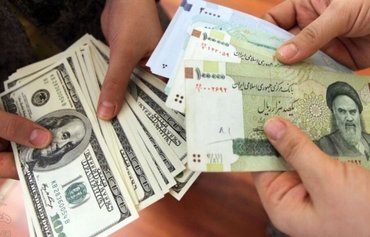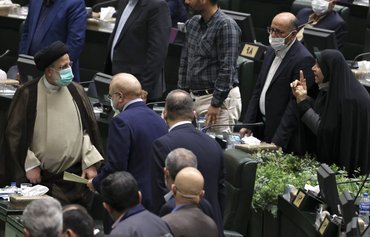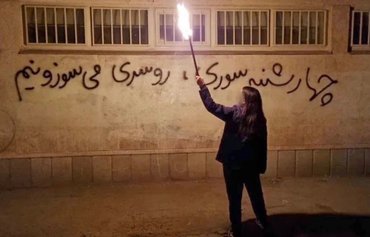As Iranians prepare for the March 20 Nowruz celebrations that usher in the country's new year, they are facing worsening economic hardship and ever-increasing inflation that the fiscal year 2023-2024 budget does little to address.
In its most recent data, the Iranian government estimates the overall inflation rate at 47.7% and point-to-point inflation at 53.4% for the 30-day period ending on February 20.
In mid-February, the rial, already at low value, rapidly dropped further, losing about half of its value against the dollar on the free market, compared to the previous February.
While the government vowed to "rein in" the exchange rate, the value of the rial increased only some 10% in early March, where it has largely remained so far.
![The IRGC's budget has increased by 28% this year. [IRNA]](/cnmi_am/images/2023/03/15/41165-Iran-IRGC-budget-600_384.jpg)
The IRGC's budget has increased by 28% this year. [IRNA]
![The rate of inflation in Iran has been estimated at 43% for the 30-day period ending on February 20. [Independent Persian]](/cnmi_am/images/2023/03/15/41145-Iran-economy-inflation-600_384.jpg)
The rate of inflation in Iran has been estimated at 43% for the 30-day period ending on February 20. [Independent Persian]
![Shoppers contemplate a purchase in Tehran's Grand Bazaar in 2021. [Faradid]](/cnmi_am/images/2023/03/15/41146-Iran-economy-shopping-600_384.jpg)
Shoppers contemplate a purchase in Tehran's Grand Bazaar in 2021. [Faradid]
The Iranian regime has long maintained it has no control over the currency exchange rate in Iran's free market, and that "enemies" and "anti-regime elements" cause the hike in the value of Western currencies against the rial.
In light of the currency's freefall, it is unclear how the government manages to periodically raise its value, albeit superficially.
In the 2022-2023 fiscal year, which ends on March 20, the regime has had to do extensive damage control, suppressing protests and blaming "enemies" for "inciting" them -- a familiar refrain any time it is challenged.
While thousands of Iranians have taken to the streets since September to protest the lack of personal freedoms, others have continued protesting their low salaries or pensions and insufficient benefits.
The government has for the most part continued to persecute protesters grappling with severe economic hardship, and to ignore their demands.
FY 2023-2024 budget
As government employees, retirees and the lower and middle socioeconomic classes are struggling to make ends meet, the Majles (Iranian parliament) has passed the bill for the new fiscal year's budget with different priorities in mind.
Similar to prior years, the budget has prioritised the Islamic Revolutionary Guard Corps (IRGC), the IRGC-aligned paramilitary Basij Resistance Forces and its affiliated forces, as well as the regime's propaganda institutions.
Although the average rate of inflation has been well over 40% in the past 11 months, government employees will receive only a 20% raise in the new year.
Meanwhile, the IRGC's budget has grown by 28% from last year, and the state-owned radio and television (IRIB) -- which broadcasts regime propaganda and forced confessions -- will receive a 42% increase in its allocation.
The conventional military (Artesh), a smaller and much weaker force than the IRGC, has gained 36% in the new budget, while the police force -- partly responsible for oppressing this year's protests -- received a 44% raise.
An astonishing 52% increase has been allocated to the Ministry of Intelligence, while an even larger increase -- 53% -- has gone to one of the regime's main propaganda organisations -- the Islamic Advertisement Organisation.
The organisation responsible for repressing personal freedoms, including women's coverage, which has the so-called morality police under its auspices, has been awarded a 33% budget raise this year.
Iran's major cities are grappling with deadly pollution, which has become progressively worse each year in the past decade, causing more school and office closures every winter.
Yet the government has slashed the 2023-2024 budget allocation to the "Initiative to Combat Air Pollution" by more than 10% compared to last year.
People 'last on the list'
"According to the budget, the government expects a 58% increase in its rate of oil exports in the new year," an Iran-based economist told Al-Mashareq on condition of anonymity.
"But it is unclear how it could achieve that given the sanctions, which restrict oil sales," he said.
As usual, he noted, the new budget demonstrates how little the regime cares for and about the Iranian people, as it continues to prioritise its illicit nuclear activities, regional interference and domestic oppression.
The government's overall budget shows an increase of 40% from one year ago but does not include an equivalent raise for government employees and retired staff.
Maryam, a 74-year-old retired teacher, told Al-Mashareq she has no idea how she will be able to afford to buy Nowruz presents for her grandchildren on her tiny monthly pension.
"Every year, I feel some shame because I can never afford to buy what I really want for my kids and grandkids. But this year is the worst, by far," she said.
"The people of this country are either the last or non-existent on the list of this regime's spending priorities," she added. "We are on the path to becoming a country like Venezuela, where the national currency has extremely low value."
Meanwhile, many environmentalists have expressed concerns about the alarmingly high level of air pollution in major Iranian cities, and the government's failure to take meaningful action to address it.
The government does nothing to resolve pollution, merely closing offices and schools when high levels of pollution trigger "dangerous air conditions".
The decrease in the allocated amount for combatting pollution shows the government does not even pretend to take it seriously, said Ali, a Shiraz-based environmental scientist who asked that only his first name be used.
Pollution threatens everyone, he told Al-Mashareq. It causes cancer and other illnesses, and it is particularly dangerous for children, the elderly and those with pulmonary or heart conditions.
"The entire world knows this; it's a proven fact," he said.
Many Iranians have demonstrated their dissatisfaction with the regime this year, Ali added, yet it does not even attempt to show it is taking a single step for them -- even for an apolitical issue such as pollution in large cities.

![The value of the Iranian rial against the dollar has fallen by about half from last year. [EcoIran]](/cnmi_am/images/2023/03/15/41164-Iran-currency-freefall-600_384.jpg)






